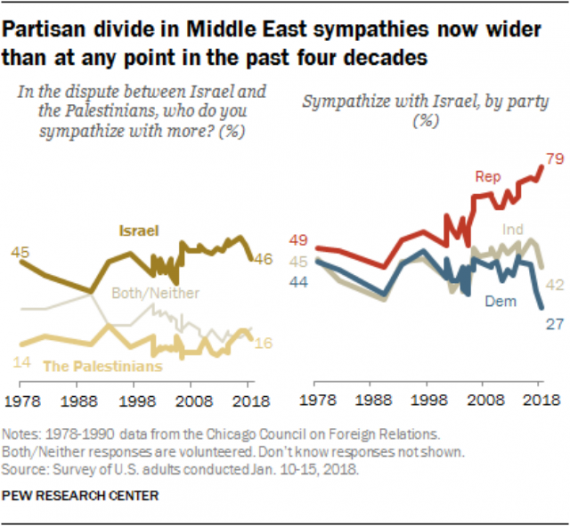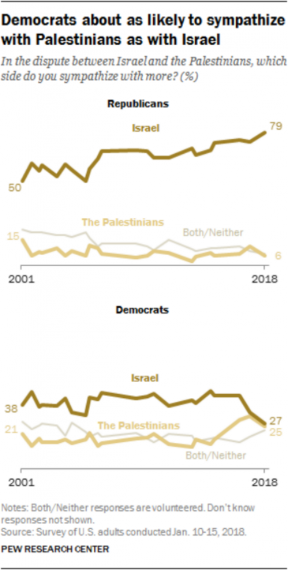The Growing Partisan Divide Over America’s Relationship With Israel
Americans were once largely united in their opinions about Israel and the Israeli/Palestinian conflict. That's not the case anymore.
A new Pew Research survey shows that there is a growing partisan divide in the United States over the issues involved in the dispute between Israel and the Palestinians, and it’s one that could have an impact on American foreign policy and American politics in the future:
The partisan divide in Middle East sympathies, for Israel or the Palestinians, is now wider than at any point since 1978. Currently, 79% of Republicans say they sympathize more with Israel than the Palestinians, compared with just 27% of Democrats.
Since 2001, the share of Republicans sympathizing more with Israel than the Palestinians has increased 29 percentage points, from 50% to 79%. Over the same period, the share of Democrats saying this has declined 11 points, from 38% to 27%.
The latest national survey by Pew Research Center, conducted Jan. 10-15 among 1,503 adults, finds that 42% say Donald Trump is “striking the right balance” in the situation in the Middle East, while 30% say he favors Israel too much (just 3% say Trump sides too much with the Palestinians; 25% do not offer an opinion).
At a similar point in Barack Obama’s presidency, 47% of Americans said he had struck a proper balance in dealing with the Middle East; 21% said he sided too much with the Palestinians, while 7% said he favored Israel too much.
The survey finds that while Republicans and Democrats are deeply divided in views of Israel, so too do they differ markedly in opinions about Benjamin Netanyahu, Israel’s prime minister. Nearly three times as many Republicans (52%) as Democrats (18%) have favorable impressions of Israel’s leader.
About half of Americans say a two-state solution is possible in the Middle East: 49% say a way can be found for Israel and an independent Palestinian state “to coexist peacefully,” while 39% say this is not possible. Democrats are far more likely than Republicans to say a two-state solution is possible (58% vs. 40%).
When asked about the dispute between Israel and the Palestinians, 46% of Americans say they sympathize more with the Israelis, 16% say they sympathize more with the Palestinians and about four-in-ten (38%) either volunteer that their sympathies are with both (5%), neither (14%) or that they do not know (19%). The overall balance of opinion has fluctuated only modestly since 1978, when 45% said they sympathized more with Israel, 14% with the Palestinians and 42% could not decide.
But the partisan divide has widened considerably, especially over the past two decades. The share of Republicans who sympathize with Israel has never been higher, dating back four decades.
Nearly eight-in-ten Republicans (79%) sympathize more with Israel than the Palestinians, while just 6% sympathize more with the Palestinians; another 7% say they sympathize with both or neither, while 9% say they do not know.
As was the case last year, Democrats are divided in views of the Middle East conflict: Currently, 27% of Democrats say they sympathize more with Israel, while 25% say they sympathize more with the Palestinians; another 23% say they sympathize with neither or both sides and one-quarter (25%) say they don’t know. Democrats also were divided last year, when 33% said they sympathized with Israel and 31% said the Palestinians. Since then, the share of Democrats saying they don’t know has increased from 17% to 25% and the share saying they sympathize with both or neither has ticked up slightly from 19% to 23%.
As recently as two years ago, in April 2016, Democrats were more likely to sympathize more with Israel (43%) than with the Palestinians (29%), with 16% saying they sympathized with both or neither.
Among Democrats, the decline over the last few years in those who say they sympathize more with Israel is seen both among liberals and among conservatives and moderates.
The share of liberal Democrats who sympathize more with Israel than the Palestinians has declined from 33% to 19% since 2016. Currently, nearly twice as many liberal Democrats say they sympathize more with the Palestinians than with Israel (35% vs. 19%); 22% of liberal Democrats sympathize with both sides or neither side and 24% do not offer an opinion.
Moderate and conservative Democrats continue to sympathize more with Israel (35%) than the Palestinians (17%). However, the share of conservative and moderate Democrats who sympathize more with Israel has declined 18 percentage points since 2016 (from 53% to 35%).
(…)
Opinions of Israel’s prime minister, Benjamin Netanyahu, are basically unchanged from last year. About as many say they have a favorable view (31%) as an unfavorable opinion (28%) of Netanyahu; 41% express no opinion of Israel’s prime minister.
Republicans, particularly conservative Republicans, have positive views of Netanyahu on balance. Six-in-ten conservative Republicans (60%) view Netanyahu favorably, while just 13% have an unfavorable opinion.
Democrats’ views of Netanyahu are much more negative. And among liberal Democrats, more than three times as many have an unfavorable view of Netanyahu (49%) than a favorable opinion (15%).
You can see the stark change in public opinion in this chart from the poll:
And in this one:
Damon Linker at The Week comments:
What was once a mere five percentage-point difference between the parties over support for Israel is now a 52-point rift.
The partisan polarization that’s produced a hollowing out of the ideological center in American public life on a growing number of issues has now reached the politics of the Middle East. The practical consequences are unlikely to be pretty.
For one thing, the growing gap between the parties opens the prospect of wild swings in policy from administration to administration. With the GOP’s military hawks and millenarian evangelicals firmly committed to defending the Jewish state regardless of its actions in the West Bank and Gaza Strip, Republican presidents will be increasingly likely to follow President Trump’s lead in siding unconditionally and unambivalently with Israel in its conflict with the Palestinians.
(…)
With the gap between the parties — and within the Democratic Party — growing ever-wider on the issue, get ready for the Israeli-Palestinian conflict to erupt in electoral form within the American political system. Add it to the lengthening list of issues on which finding common ground and consensus eludes us as a nation.
There are more details, including more detailed demographic breakdowns, at the link, but the general conclusion is clear. When it comes to attitudes toward Israel the last ten years or so have seen a distinct change from what used to be the status quo in the United States. This is most notable with respect to the Republican Party, where blind and unquestioning support for Israel generally and Netanyahu specifically has become something of a litmus test. As I’ve noted before, this wasn’t always the case:
There was a time when Republican Presidents and politicians were critical of Israeli actions and even openly defied the wishes of the Israeli government and its supporters in the United States. President Eisenhower put pressure on Israel, Britain, and France when those three nations invaded Egypt in an effort to seize the Suez Canal. President Nixon supported Israel during the Yom Kippur War, but was also critical of Israeli policy when it conflicted with his policy of currying favor with anti-Communist Arab nations that were also opposed to Israel. President George H.W. Bush’s Administration was similarly critical of Israel and actively lobbied the nation against retaliating when Saddam Hussein began lobbing Scud Missiles toward Israel during the Persian Gulf War in an effort to break the multinational coalition that was, quite literally, on Iraq’s doorstep. And, perhaps most significantly for contemporary Republicans, the policy of the Reagan Administration toward Israel in the 1980s was far from obsequious and often quite critical. For example, Reagan defied objections from Israel and its supporters in the U.S. and sold AWACS aircraft to Saudi Arabia, supported a United Nations resolution condemning Israel’s attack on a nuclear plant in Iraq, and strongly criticized the Israeli invasion of Lebanon in June 1982. Additionally, both the Reagan and Bush 41 Administrations called on Israel to reach out to Arabs as part of Middle East peace initiatives.
None of that would be welcome in the modern Republican Party. Not only is criticism of Israel seemingly not allowed, but even questioning the assertion that Israel is “America’s most important ally” or arguing that policies of the Israeli government vis a vis its neighbors or the Palestinians are wrong is met with attacks, derision, and the assertion that the person making the argument may be bigoted. This kind of attitude is as wrong when its applied to Israel as it would be when applied to the United States. Even accepting the notion that Israel is our “most important” ally, a debate assertion to be honest, must mean being willing to criticize that ally when they do something wrong. It also means recognizing that the interests of the United States and the interests of Israel, while often parallel are not identical. President Reagan recognized that fact, but one has to wonder what the new Republican orthodoxy on Israel would have to say about him today.
Rather than bipartisan unity when it comes to American policy toward Israel, the last fifteen years or so have shown indications of the stark and increasing partisan divide that this poll finds. The differences, for example, in American foreign policy toward Israel and the Israeli/Palestinian issue has shown significant differences that began during the Administration of George W. Bush, who many people described as the most pro-Israeli President in American history. Bush, of course, was followed by Barack Obama whose policies toward Israel were roughly the same as those of his predecessors. Despite that fact, though, it became clear that there was significant antipathy between Obama and Israeli Prime Minister Benjamin Netanyahu, principally over the issue of how to approach Iran and the Iranian nuclear research program. Because of that, many Republicans and conservatives characterized Obama as being anti-Israel, or even anti-Semitic, notwithstanding the fact that his Administration was, if anything, even more pro-Israeli than some Republican President’s such as Ronald Reagan, who had significant differences issues with many things Israel did such as its war in Lebanon in the early 1980s. Now, of course, we have the Trump Administration which appears to have put the American thumb on the scale in Israel’s favor far more than any of its predecessors. This can be seen most notably, of course, in the recognize Jerusalem as Israel’s capital notwithstanding the outstanding issues regarding its status and decision to decertify Iranian compliance with the 2015 nuclear deal despite the fact that all of the available evidence shows that Iran is complying with its obligations under the agreement.
If I were an Israeli official or politician, I would be deeply concerned about this evidence of an increasing partisan divide in the United States regarding Israel. In the past, Israeli leaders could count on the fact that the United States would largely be in their corner. With polling in the United States showing not only a deep divide between Republicans and Democrats over support for Israel but also a decline in pro-Israeli sentiment among self-identified Independents. In no small part, it strikes me that much of this can be laid at the feet of Israeli Prime Minister Benjamin Netenyahu, who has done more than any of his predecessors to stoke the partisan fires here in the United States when he believes it to be in the interests of his country or, more specifically, in his personal political interests. This was most apparent, of course, during the Obama year when Netanyahu seemed to go out of his way to go behind the back of the Administration in communications with Republicans in Congress in which he clearly sought to undermine the ongoing negotiations with Iran over its nuclear weapons program This included a speech to Congress in March 2016 when he was running for re-election at the invitation of House Republicans, a decision that was opposed by most Americans. All of this has no doubt contributed to the partisan gap when it comes to policy toward Israel, and if it continues it could mean changes in American policy in the future based solely on which party controls the White House. This would not be in Israel’s interests, of course, and it suggests that it would be better for them to be more mindful of the fact that there is more than one political party in the United States.



Netanyahu did a lot to damage his country’s bipartisan relationship with the US — and he got nothing for it in the end, as the Iran Nuclear Deal went through. Trump has solidified this divide by moving the embassy.
I cannot imagine that turning your country’s relationship with its biggest ally into a political football in the domestic politics of that ally is a good idea, but what do I know?
Wonder what Netanyahu and the other Israeli politicians will do when they discover that a lot of the lunatics supporting them in the US are expecting them to all die in a nuclear holocaust in preparation for the Second Coming. Either that or convert to Christianity.
The trouble with using a bunch of religious lunatics to keep yourself in power is at some point their “support” of you may end up pushing you down paths you don’t like to go down.
@grumpy realist:
Bibi isn’t stupid. He just doesn’t care. I’ve known a lot of right-wing Jews (and I’ve also read the writings of Norman Podhoretz), and many of them hold to an “enemy of my enemy is my friend” logic in which they view the evangelical Zionist nuts as the lesser of the two evils. But Bibi has brought this level of myopia to new heights. He declared at the start of Trump’s presidency that the Jewish state had no greater friend than Trump–a man who has made openly anti-Semitic tweets and played footsie with massive Jew-haters such as David Duke. Like Trump himself, Bibi waited several days before issuing a vague, anodyne condemnation of the neo-Nazis in Charlottesville. (In contrast, his right-wing rival Naftali Bennett issued a clear and unequivocal condemnation immediately. Not everyone on the Israeli right has got their head as far up Trump’s ample tuches as the Prime Minister.) But perhaps the most telling incident was when Bibi’s son retweeted an overtly anti-Semitic graphic about George Soros.
These people have cast their lot in with the heirs to Hitler, all the while thinking they’re the ones saving the Jews from themselves.
Being pro-Israel and being pro-Bibi/Likud are two different things. I can certainly tell the difference. But we do this with many of our foreign relations: we put all our eggs in the Yeltsin basket or the Mubarak basket or the Shah of Iran basket and then get really surprised when political forces we ignored turn out to have big impacts on their own countries.
I often wonder what we’re missing in Israel or Iraq or Russia or Europe because we prefer to personalize relations with only one or two people per country.
The American people support Israel. Most countries are against Israel and many will eventually unite against Israel: Iran, Russia, Arabia, Turkey.